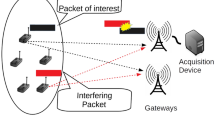Abstract
Congestion control is an important building block of a Quality of Service (QoS) system for multicast-based multimedia services and applications on the World Wide Web. We propose an end-to-end single-rate source-based multicast congestion control scheme (LE-SBCC) for reliable or unreliable multicast transport protocols. It addresses all the pieces of the single-rate multicast congestion control problem including drop-to-zero issues, TCP friendliness and RTT estimation. The scheme design consists of a cascaded set of filters and a rate-based additive-increase multiplicative-decrease (AIMD) module. These filters together transform the multicast tree to appear like a unicast path for the purposes of congestion control. Unlike TCP, the scheme is not self-clocked but acts upon a stream of loss indications (LIs) from receivers. These LIs are filtered to get a stream of loss events (LEs) (S. Floyd et al., in SIGCOMM 2000, Aug. 2000) (at most one per RTT per receiver). This LE stream is further filtered to extract the maximum LEs from any one receiver. Then the scheme effects at most one rate-reduction per round trip time (RTT). A range of results (simulation and experimental) is presented and compared against the mathematical model of the scheme components. Furthermore, we have successfully adapted TFRC (Op. cit) to our scheme, which is important to multimedia services desiring relatively stable rates over short time scales.
Similar content being viewed by others
References
D. Bansal and H. Balakrishnan, “Binomial congestion control algorithms,” in INFOCOM 2001, April 2001.
S. Bhattacharyya et al., “A novel loss indication filtering approach for multicast congestion control,” J. of Comp. Commns, to appear.
S. Bhattacharyya, D.Towsley, and J.Kurose, “Efficient multicast flowcontrol using multiple multicast groups,” U. Mass, Amherst, CMPCSI Technical Report TR 97–15, 1997.
S. Bhattacharya, D. Towsley, and J. Kurose, “The loss path multiplicity problem in multicast congestion control,” in INFOCOM'99, March 1999.
J.C. Bolot, T. Turletti, and I. Wakeman, “Scalable feedback control for multicast video distribution in the internet,” in SIGCOMM'94, Aug. 1994.
S. Bradner et al., “IETF criteria for evaluating reliable multicast transport and application protocols,” in RFC 2357, June 1998.
J.W. Byers et al., “FLID-DL congestion control for layered multicast,” in NGC 2000, Nov. 2000.
S. Floyd et al., “Equation-based congestion control for unicast applications,” in SIGCOMM '00, Aug. 2000.
J. Golestani, “Fundamental observations on multicast congestion control in the internet,” in INFOCOM 1999, March 1999.
R. Gopalkrishnan et al., “Stability and fairness issues in layered multicast,” in NOSSDAV 1999, June 1999.
M. Handley et al., “The reliable multicast design space for bulk data transfer,” in RFC 2887, Aug. 2000.
K. Kar, S. Sarkar, and L. Tassiulas, “Optimization based rate control for multirate multicast sessions,” in INFOCOM '01, April 2001.
S. Kasera et al., “Scalable fair reliable multicast using active services,” IEEE Network Magazine, Jan./Feb. 2000.
S. McCanne, V. Jacobson, and M. Vetterli, “Receiver-driven layered multicast,” in SIGCOMM '96, Aug. 1996, pp. 117–130.
N. Natu, P. Rajagopal, and S. Kalyanaraman, “GSC: A generic source-based congestion control algorithm for reliable multicast,” J. of Comp. Commns, vol. 24, nos. 5/6, pp. 575–589, 2001.
J. Padhye et al., “Modeling TCP throughput: A simple model and its empirical validation,” in SIGCOMM'98, Aug. 1998.
S. Ramakrishnan, S. Kalyanaraman, J. Wen, and H. Ozbay, “Effect of time delay in network traffic control,” short paper presented at Automatic Controls Conference (ACC), 2001.
I. Rhee et al., “MTCP: Scalable TCP-like congestion control for reliable multicast,” in INFOCOM '99, March 1999.
L. Rizzo, “PGMCC: A TCP-friendly single-rate multicast congestion control scheme,” in SIGCOMM '00, Aug. 2000.
D. Rubenstein, J. Kurose, and D. Towsley, “The impact of multicast layering on network fairness,” in SIGCOMM '99, Sept. 1999.
K. Seada and A. Helmy, “Fairness analysis of multicast congestion control:Acase study on pgmcc,” Technical Report 01–743, University of Southern California, CS Department, April 2001.
T. Speakman et al., “PGM reliable transport protocol specification,” Internet Draft, March 2000.
L. Vicisano, L. Rizzo, and J. Crowcroft, “TCP-like congestion control for layered multicast data transfer,” in INFOCOM '98, April 1998.
B. Whetten and J. Conlan, “A rate based congestion control scheme for reliable multicast,” inRMRGMeeting, July 1998.
B. Whetten and G. Taskale, “An overviewof reliable multicast transport protocol II,” IEEE Network Magazine, Jan./Feb. 2000.
J. Widmer and M. Handley, “Extending equation-based congestion control to multicast appliations,” in SIGCOMM 2001, Aug. 2001.
Author information
Authors and Affiliations
Rights and permissions
About this article
Cite this article
Thapliyal, P., Sidhartha, Li, J. et al. LE-SBCC: Loss-Event Oriented Source-Based Multicast Congestion Control. Multimedia Tools and Applications 17, 257–294 (2002). https://doi.org/10.1023/A:1015733221271
Issue Date:
DOI: https://doi.org/10.1023/A:1015733221271




